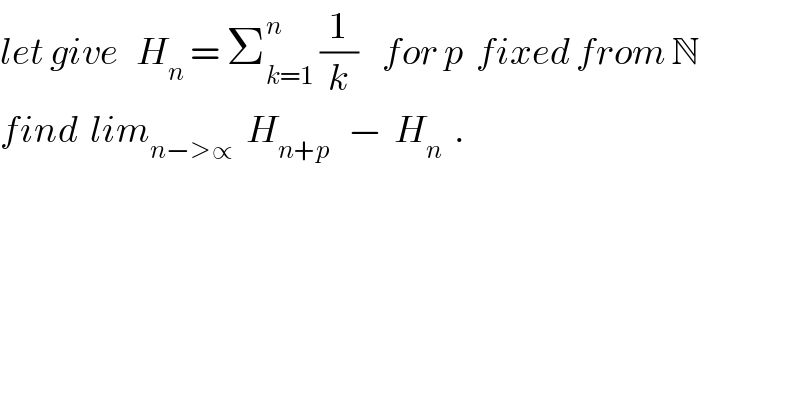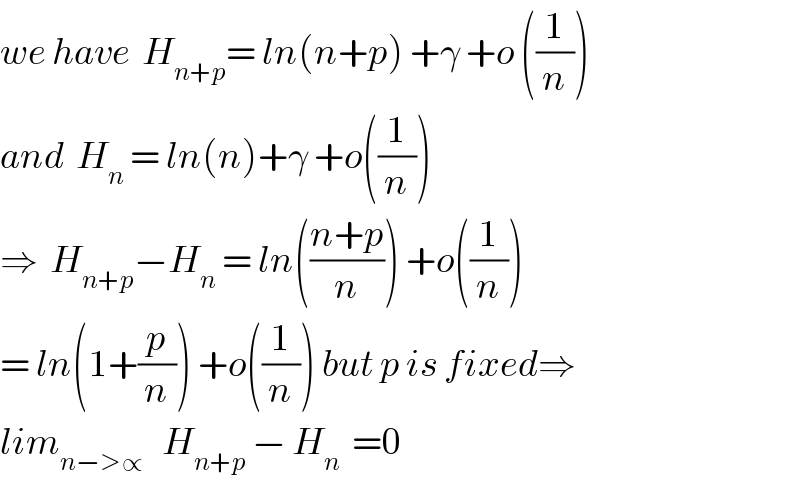
Question Number 27097 by abdo imad last updated on 02/Jan/18

$${let}\:{give}\:\:\:{H}_{{n}} \:=\:\sum_{{k}=\mathrm{1}} ^{{n}\:\:} \:\frac{\mathrm{1}}{{k}}\:\:\:\:{for}\:{p}\:\:{fixed}\:{from}\:\mathbb{N}\: \\ $$ $${find}\:\:{lim}_{{n}−>\propto} \:\:{H}_{{n}+{p}} \:\:\:−\:\:{H}_{{n}} \:\:. \\ $$
Commented byprakash jain last updated on 02/Jan/18

$$\mathrm{What}\:\mathrm{is}\:\mathrm{the}\:\mathrm{mistake}\:\mathrm{in}\:\mathrm{my}\:\mathrm{argument}. \\ $$ $$\underset{{n}\rightarrow\infty} {\mathrm{lim}}\:\underset{{i}=\mathrm{1}} {\overset{{p}} {\sum}}\frac{\mathrm{1}}{{n}+{i}}=\mathrm{0}\:\left(\mathrm{if}\:{p}<\infty\right) \\ $$
Commented byabdo imad last updated on 02/Jan/18

$${we}\:{have}\:\:{H}_{{n}+{p}} =\:{ln}\left({n}+{p}\right)\:+\gamma\:+{o}\:\left(\frac{\mathrm{1}}{{n}}\right) \\ $$ $${and}\:\:{H}_{{n}} \:=\:{ln}\left({n}\right)+\gamma\:+{o}\left(\frac{\mathrm{1}}{{n}}\right) \\ $$ $$\Rightarrow\:\:{H}_{{n}+{p}} −{H}_{{n}} \:=\:{ln}\left(\frac{{n}+{p}}{{n}}\right)\:+{o}\left(\frac{\mathrm{1}}{{n}}\right) \\ $$ $$=\:{ln}\left(\mathrm{1}+\frac{{p}}{{n}}\right)\:+{o}\left(\frac{\mathrm{1}}{{n}}\right)\:{but}\:{p}\:{is}\:{fixed}\Rightarrow \\ $$ $${lim}_{{n}−>\propto} \:\:\:{H}_{{n}+{p}} \:−\:{H}_{{n}} \:\:=\mathrm{0} \\ $$
Answered by prakash jain last updated on 02/Jan/18

$$\underset{{n}\rightarrow\infty} {\mathrm{lim}}\left({H}_{{n}+{p}} −{H}_{{n}} \right) \\ $$ $$=\underset{{n}\rightarrow\infty} {\mathrm{lim}}\:\underset{{i}=\mathrm{1}} {\overset{{p}} {\sum}}\frac{\mathrm{1}}{{n}+{i}}=\mathrm{0}\:\:\:\:\:\:\:\:\:\left({p}<\infty\right) \\ $$
Commented byabdo imad last updated on 02/Jan/18

$${you}\:{must}\:{add}\:{that}\:{p}\:{is}\:{fixed}\:. \\ $$
Commented byprakash jain last updated on 02/Jan/18
understood. thanks
